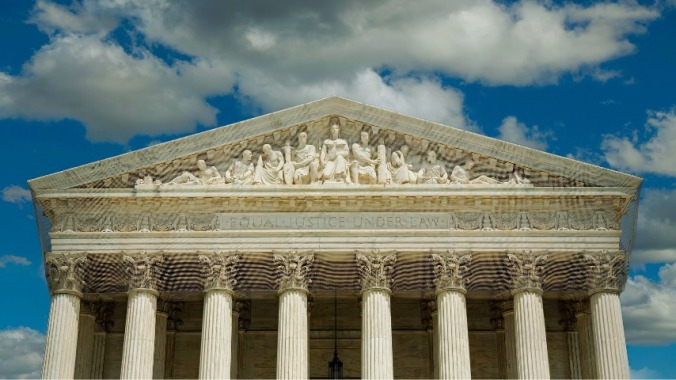Supreme Court Arguments Devolve Into Weird Panic Over Trans Kids’ Fertility
During Wednesday's oral arguments for U.S. v. Skrmetti, Brett Kavanaugh and an attorney for Tennessee talked about trans children’s future reproduction. Weird weird weird!
Photo: Shutterstock Politics
There’s a reason Tim Walz’s now-famous “weird” line of attack against conservatives once resonated, and it’s that conservatives and so many of their core fights are deeply fucking weird! That was very much on display Wednesday morning at the Supreme Court when the Justices heard oral arguments for U.S. v. Skrmetti, a case involving trans children’s access to life-saving gender-affirming health care that challenges Tennessee’s current ban.
Some background: In March 2023, Tennessee Gov. Bill Lee (R) signed SB 1, which prohibits health care workers from providing gender-affirming health care to transgender youth, including puberty blockers and hormone replacement therapies. However, minors who aren’t trans are still allowed to receive these treatments for varying reasons. SB 1, which forced trans youth to end their care by March 31 of this year, also allows minors or their parents to sue trans health care providers if they’ve suffered “harm” following treatment. In response to SB 1, trans children and their families sued the state of Tennessee. They’re represented by attorneys for the Biden administration, Lambda Legal, and the ACLU — specifically, the ACLU’s Chase Strangio, who became the first known transgender person to argue before the Supreme Court on Wednesday.
In June 2023, a federal judge issued a decision that would have blocked SB 1, but Tennessee immediately filed a successful appeal at the U.S. Court of Appeals for the Sixth Circuit. The plaintiffs appealed to the Supreme Court, which announced in June that they would hear the case. And now, here we are!
While Strangio and Solicitor General Elizabeth Prelogar argued SB 1 amounts to sex-based discrimination, at different points, conservatives tried to hurl the court down a junk science rabbit hole over how gender-affirming care could supposedly impact trans kids’ future fertility. First, Kavanaugh raised to Prelogar that gender-affirming care came with risks of fertility loss, which Prelogar pointed out is untrue: Puberty blockers don’t affect fertility, and even if that were the case, a wide range of medical treatments that do affect fertility aren’t banned.
“Critically, puberty blockers have no effect in and of themselves on fertility, so I don’t think that concern can justify the ban on puberty blockers, which is just pressing pause on someone’s puberty to give them more time to understand their identity… There are other treatments for adolescents that likewise affect puberty including… [for] intersex individuals who often have surgeries as infants that might permanently affect their fertility.” Prelogar also raised that even if impacts on future fertility were a concern for gender-affirming health services, that still doesn’t warrant a ban: “If you are concerned about fertility there are measures the state could undertake like requiring warnings, more informed counseling, trying to ensure there’s informed consent in this area” instead of sweepingly banning medical treatments that can be a lifeline for trans kids.
-

-

-

-

-

-

-

-

-

-

-

-

-

-

-

-

-

-

-

-

-

-

-

-

-

-

-

-

-

-

-

-

-

-

-

-

-

-

-

-








































